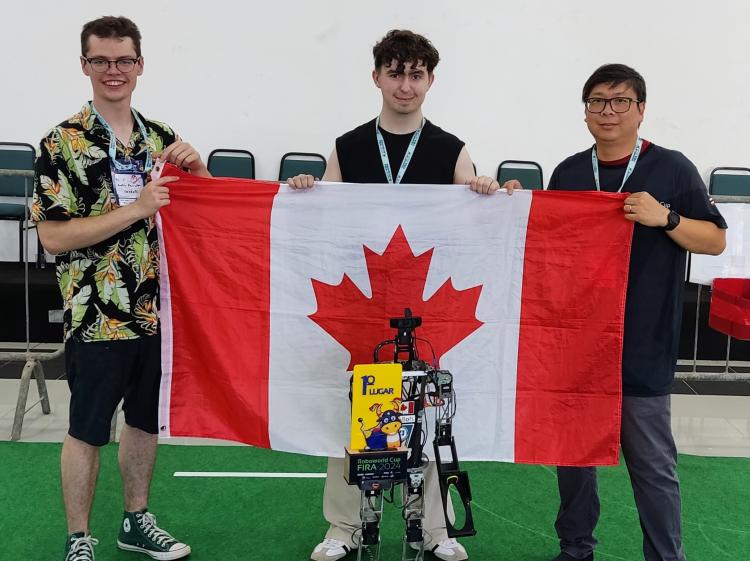The newly formed "Snobots" and the Laurentian Intelligent Mobile Robotics Lab (LIMRL), are already making history. The Snobots, 4th-year Computer Science students Austin Barrett and Nicolas Pottier, showcased their impressive skills at the FIRA RoboWorldCup 2024 in Brazil where they earned four gold medals, a silver medal, and placed first overall in the prestigious HuroCup Adult-Sized Humanoid Competition.

Austin Barrett, Nicolas Pottier, and Dr. Meng Cheng Lau
LIMRL is a dynamic new addition to Laurentian University's Faculty of Science, Engineering, and Architecture that blends teaching and research, focusing on a range of mobile robots from wheeled platforms to advanced legged humanoid robots. With about 20 students involved so far, the dedicated lab space provides a platform for hands-on learning in programming, control systems, and robot design.
Dr. Meng Cheng Lau, assistant professor in the Bharti School of Engineering and Computation, developed LIMRL, making it possible for Austin and Nicolas to form the Snobots. He says that although he supervised the students and supported them where needed, it was the students' dedication and collaboration that proved to be the keys to their success at the international event.
"Austin and Nicolas worked incredibly hard to make this happen. Their commitment and teamwork were absolutely crucial to their success."
Austin and Nicolas say they were inspired by Dr. Lau's stories from past robotics competitions. "He shared his experiences with us, and we were immediately drawn to the idea," Austin recalls. "Our shared interest grew into forming our team and spending the summer preparing intensely for FIRA."
Their human-like robot, Polaris, stands as a testament to their hard work and creativity. At about three feet tall, made of both metal and 3D printed parts, with 20 degrees of freedom for a broad range of motion, Polaris is designed for both durability and agility. The team used two programming languages, Python and C++, to program Polaris. Equipped with a webcam-like head and a computer in its chest, Polaris can handle various tasks autonomously by assessing situations and making decisions.
Though the Snobot's recent success demonstrates their exceptional capabilities, the true focus remains on their journey and the lab's potential. "Our goal is to continue expanding the team and welcoming more students from all disciplines to LIMRL," Nicolas shares. "We want to collaborate and develop even more advanced robots."
"The Laurentian Intelligent Mobile Robotics Lab is not just a space for technical learning but a launchpad for future careers in areas like autonomous systems in the mining sector," explains Dr. Lau. With uncapped research and learning potential, Dr. Lau hopes the lab becomes a cornerstone of the student experience for all those interested in robotics.













